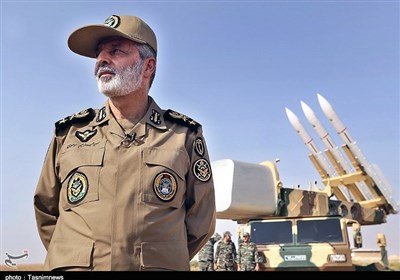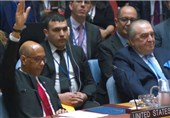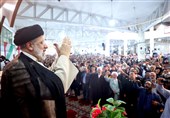Pompeo’s Nomination Aimed at Frustrating Iran over JCPOA: US Researcher
TEHRAN (Tasnim) – An independent political researcher from Los Angeles said the US president dumped Rex Tillerson as secretary of state and chose CIA director Pompeo to replace him in an attempt to “frustrate” Iran so that the Islamic Republic would ultimately pull out of the 2015 nuclear deal.
“... the definitively Iranian-phobic Pompeo is meant to anger and frustrate the Iranian leadership into ultimately tearing up the JCPOA agreement, thereby triggering the presumed need then for a collective security response from the US and its allies,” Pye Ian told the Tasnim news agency.
Pye Ian is an independent economic and geopolitical researcher as well as a strategic planning and business development advisor. His articles and analyses on international affairs, economic trends and cultural topics have been published in various mainstream and alternative press sources. Ian’s wider intellectual interests are reflected in his writings on the convergence of foreign affairs, political philosophy, history, global finance and energy policy. He has undergraduate degrees in economics and political science from the University of California and a Master’s degree in finance from Cambridge University.
Following is the full text of the interview.
Tasnim: Reports suggest that US President Donald Trump’s sacking of his top diplomat, Rex Tillerson, signals Washington’s likely withdrawal from the Iran nuclear agreement. Do you believe so? Do you think it would spell trouble for the deal?
Ian: First, Trump isn’t in charge of anything. He is simply an installed figurehead representing the interests of the transatlantic elite establishment, which *is* in charge, and perennially so, regardless of the political party or personality sitting in the White House (or Congress, for that matter). Hence why longstanding establishment Machiavellian operator and policy representative Henry Kissinger is essentially dictating so many policy points to Trump directly, having met with Trump countless times both before and after Trump’s “election” (read: appointment) to the US Presidency.
Second, and hence, Trump didn’t truly “sack” Tillerson, as the latter was also essentially appointed to a governmental office by Kissinger and said establishment in order to try and achieve certain geostrategic goals in a short amount of time, and mostly involving Russia, considering that, as CEO of Exxon, Tillerson had quite a bit of business negotiations with the Russians in the past. There was subsequently a political need to try and portray an otherwise neoconservative-run White House as retaining a semblance of ‘Russian friendliness’ in their ranks. The Russians and everyone else around the world saw through that ruse, however, and Tillerson didn’t get very far policy-wise with Russia or her tight allies China, Iran, Syria, Iraq, Turkey and a rising number of other nations which are exhausted with the Washington and Atlanticist Consensus on global economic and political affairs.
No, Tillerson’s ‘assignment’ was essentially over, and Tillerson generally hated working in political life. Hence his exit from the State Department had been planned long before said “sacking”, and yet the exit had to be portrayed as an ‘abrupt sacking’ – without Tillerson being aware of it – in order to further paint Trump as an unpredictable – and possibly unhinged – leader in this newest iteration of the Kissingerian “Madman Theory” of tactical leadership, which seeks to scare foreign leaders into submitting to US and Western dictations.
Third, yes, the replacing of Tillerson with a thoroughly neoconservative-compliant Mike Pompeo as Secretary of State is meant to signal to the world that said Atlanticist establishment is ‘fed up’ with trying to negotiate for its preferences and will thus become more unpredictable – possibly even belligerent – in seeking to procure its interests. Again, keep that “Madman Theory” in mind, as ‘throwing opponents off of their game’ is the core intent of anything under its rubric. So, the definitively Iranian-phobic Pompeo is meant to anger and frustrate the Iranian leadership into ultimately tearing up the JCPOA agreement, thereby triggering the presumed need then for a collective security response from the US and its allies.
Yes, despite Iran sticking to the JCPOA agreement to the letter ever since it commenced in 2015, the neoconservative Atlanticist faction wants the deal to end because it apparently isn’t granting the wanted leverage against Iran which the West sought in drawing up said deal in the first place. It’s no longer about whether Iran is ‘holding to the agreement’ or not, but about finding out a way to trigger “regime change” within Iran, and ideally via Iran starting hostilities in some fashion.
Tasnim: What is your take on Mike Pompeo, who is an avowed Iran hawk? What is the message behind his appointment?
Ian: As stated above, Pompeo is a thorough “neoCON”, or neoconservative-compliant apparatchik. I.E. He obeys the purposefully opaque mandates of the “Deep State”, especially considering his prior roles in US intelligence. One could then easily surmise that Pompeo was directly or indirectly involved in sabotaging Iran or Iranian interests in some capacity over the past two decades, and has certainly been outspoken in painting Iran propagandistically as “a terrorist state”.
The message behind Pompeo’s appointment at State is to send firm warnings to Iran of Atlanticist desires for implementing “regime change” as rapidly as possible, and by any and all means necessary, partly in order for fast forwarding Atlanticist and Israeli expansionary interests across the Middle East and North Africa free of defensive ‘hindrances’. Pompeo will also be there to signal to Iran’s allies – Russia, China, Syria, Lebanon, Turkey, the Central Asian ‘Stan nations, South and East Asian nations, and African countries - that the US, UK, Israel and their Atlanticist, EU and UK Commonwealth allies will not tolerate any further divergence from US Dollar and Petrodollar Hegemony in global finance, or Washington Consensus goals in geopolitical affairs in general.
Pompeo’s replacing Tillerson actually represents a paucity of credible, sober policy options on the part of not just Washington, but said Atlanticist establishment in general in dealing with the tightening, momentum-building alliances proceeding between global Eastern and Southern hemispheric nations which seek multipolar alternatives to an imposed unipolar American vision for international affairs. It further represents geopolitical desperation in the way of trying to ‘scare’ foreign leaders into acquiescing to Western economic and political demands, despite the increasingly over-indebted fiscal straights which the collective of western economies find themselves in. Yes, the geo-economic stakes are high – nay, unprecedented – and therefore so are the unbearably irrational responses from over-leveraged parties facing collective currency risks. Generally, another 2008 Financial Crisis is imminent, which will collapse more bulge-bracket multinational investment banks. The question of “when” is highly contingent upon increasingly interdependent political and economic affairs between nations of the East and West, North and South.
Tasnim: What would happen if Trump pulls out of the JCPOA? What kind of reaction should Iran have?
Ian: As mentioned, the intent is to frustrate Tehran enough with bombast, political subterfuge and outright acts of sabotage so that Iran pulls out of the JCPOA agreement. Yet Iran knows that this is the game plan, as do Iran’s allies. Iran has thus played its hand very cautiously and with replete discretion. So, it will be up to Washington – egged on repeatedly by Netanyahu’s demonstrably corrupt government – to ‘draw first blood’ by pulling out of the JCPOA.
Were that the outcome over the next year or two, then Iran should be prepared to immediately appeal to the IAEA, UN Security Council, International Court of Justice and every other universal legal, regulatory and security institution regarding Washington’s flagrant breach. For those who argue that the JCPOA cannot legally be “breached” based on how it was drawn up, there must be emphasized the wider, more significant aspect of perennially and conclusively displayed Bad Faith on the part of the US with regard to international agreements of any sort.
Iran should also prepare for such a possible (probable) inevitability by solidifying its economic, security, legal, political and logistical relationships with Russia, China, Iraq, Syria, Turkey, Pakistan and other regional and global allies, because said tactic on the part of the US will be accompanied by predictable efforts to further ‘divide and conquer’ Iran away from her relationships with forward-looking nations.





